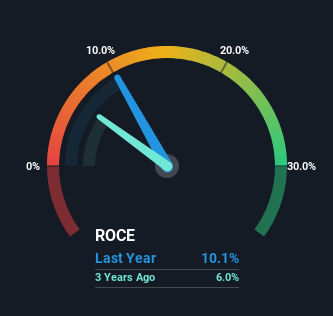- South Korea
- /
- IT
- /
- KOSE:A307950
Hyundai Autoever's (KRX:307950) Returns On Capital Not Reflecting Well On The Business
There are a few key trends to look for if we want to identify the next multi-bagger. Typically, we'll want to notice a trend of growing return on capital employed (ROCE) and alongside that, an expanding base of capital employed. If you see this, it typically means it's a company with a great business model and plenty of profitable reinvestment opportunities. Although, when we looked at Hyundai Autoever (KRX:307950), it didn't seem to tick all of these boxes.
Understanding Return On Capital Employed (ROCE)
Just to clarify if you're unsure, ROCE is a metric for evaluating how much pre-tax income (in percentage terms) a company earns on the capital invested in its business. The formula for this calculation on Hyundai Autoever is:
Return on Capital Employed = Earnings Before Interest and Tax (EBIT) ÷ (Total Assets - Current Liabilities)
0.10 = ₩197b ÷ (₩2.9t - ₩907b) (Based on the trailing twelve months to June 2024).
Thus, Hyundai Autoever has an ROCE of 10%. In absolute terms, that's a satisfactory return, but compared to the IT industry average of 7.3% it's much better.
See our latest analysis for Hyundai Autoever

Above you can see how the current ROCE for Hyundai Autoever compares to its prior returns on capital, but there's only so much you can tell from the past. If you're interested, you can view the analysts predictions in our free analyst report for Hyundai Autoever .
So How Is Hyundai Autoever's ROCE Trending?
On the surface, the trend of ROCE at Hyundai Autoever doesn't inspire confidence. Around five years ago the returns on capital were 13%, but since then they've fallen to 10%. Although, given both revenue and the amount of assets employed in the business have increased, it could suggest the company is investing in growth, and the extra capital has led to a short-term reduction in ROCE. And if the increased capital generates additional returns, the business, and thus shareholders, will benefit in the long run.
On a related note, Hyundai Autoever has decreased its current liabilities to 32% of total assets. So we could link some of this to the decrease in ROCE. What's more, this can reduce some aspects of risk to the business because now the company's suppliers or short-term creditors are funding less of its operations. Since the business is basically funding more of its operations with it's own money, you could argue this has made the business less efficient at generating ROCE.
The Bottom Line
While returns have fallen for Hyundai Autoever in recent times, we're encouraged to see that sales are growing and that the business is reinvesting in its operations. And the stock has done incredibly well with a 181% return over the last five years, so long term investors are no doubt ecstatic with that result. So while investors seem to be recognizing these promising trends, we would look further into this stock to make sure the other metrics justify the positive view.
If you're still interested in Hyundai Autoever it's worth checking out our FREE intrinsic value approximation for A307950 to see if it's trading at an attractive price in other respects.
For those who like to invest in solid companies, check out this free list of companies with solid balance sheets and high returns on equity.
Valuation is complex, but we're here to simplify it.
Discover if Hyundai Autoever might be undervalued or overvalued with our detailed analysis, featuring fair value estimates, potential risks, dividends, insider trades, and its financial condition.
Access Free AnalysisHave feedback on this article? Concerned about the content? Get in touch with us directly. Alternatively, email editorial-team (at) simplywallst.com.
This article by Simply Wall St is general in nature. We provide commentary based on historical data and analyst forecasts only using an unbiased methodology and our articles are not intended to be financial advice. It does not constitute a recommendation to buy or sell any stock, and does not take account of your objectives, or your financial situation. We aim to bring you long-term focused analysis driven by fundamental data. Note that our analysis may not factor in the latest price-sensitive company announcements or qualitative material. Simply Wall St has no position in any stocks mentioned.
About KOSE:A307950
Hyundai Autoever
Provides information and communication technology services in South Korea and internationally.
Flawless balance sheet with acceptable track record.
Market Insights
Community Narratives




